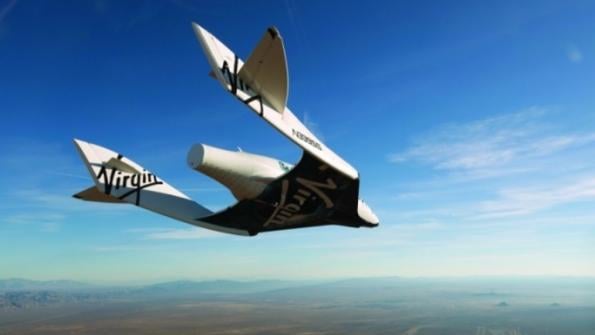
LOS ANGELES—As part of long-term ambitions to develop a high-speed, long-range commercial transport system, Virgin Galactic and its subsidiary The Spaceship Company (TSC) have signed a Space Act Agreement with NASA to help foster the development of technology for high Mach-capable vehicles.
Virgin, which aims to start commercial suborbital flight services later this year with the SpaceShipTwo (SS2) spaceplane, says the agreement is designed to “advance the United States’ efforts to produce technically feasible, high-Mach vehicles for potential civil applications.” The work with NASA will support the company’s plan to “develop a vehicle for the next generation of safe and efficient high-speed air travel, with a focus on customer experience and environmental responsibility.”
Virgin tells Aerospace DAILY that examples of the research work with NASA include collaboration on vehicle thermal management and “propulsion system options in the Mach 3 -5 regime.” The focus on thermal protection and propulsion up to the threshold of hypersonic conditions dovetails with Virgin’s long-running plans to develop an “SS3” high-speed transport derivative follow-on to the Mach 3 SS2 spaceplane.
“Virgin Galactic’s unique experience and innovative technology platform will, in partnership with the historic capabilities of NASA and other government agencies, enable the progression of new technical steps that will improve U.S. competitiveness,” says George Whitesides, CEO of Virgin Galactic Holdings, the parent company of the spaceline and TSC. “We see this as an area with tremendous growth potential that we will continue to invest in, alongside our commercial spaceflight operations,” he adds.
Virgin Galactic also confirms that, despite the ongoing financial pressures caused by the COVID-19 pandemic, the strategic alliance announced in October 2019 with Boeing is still active. Under this agreement, Boeing and Virgin announced they will collaborate on technology for high-speed atmospheric transport systems and commercial space access systems.
The alliance, under which Boeing’s HorizonX capital investment arm invested $20 million in exchange for Virgin Galactic shares, supports Boeing’s high-speed commercial development road map. Over recent years this has included investments in the Aerion AS2 supersonic business jet; the Reaction Engines hypersonic Sabre propulsion system and the company’s own Mach 5 passenger vehicle project.




